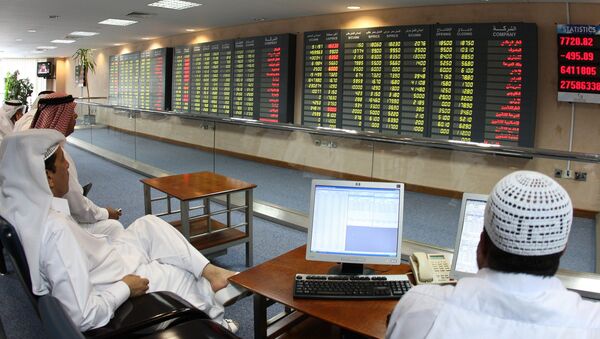Kristian Rouz — Sunday's trading in Middle Eastern bourses was defined by a resurgence in Qatar's stocks after Friday's losses prompted by the corruption scandal at FIFA, the world's football regulative authority. After Sepp Blatter was re-elected FIFA President despite bribery allegations and harsh resistance from most European and North American members, easing concerns over Qatar's capital Doha possibly losing the right to host the 2022 World Cup, Qatar's shares rallied buoyantly. The rest of the region's markets were pushed higher by oil prices edging up slightly, while in Israel the bull market propelled stocks to their all-time high due to accommodative monetary policies at the nation's central bank.
"Now with Blatter in again, investors are excited that the 2022 World Cup will probably go ahead unhindered," Tariq Qaqish of the Dubai-based Al Mal Capital said.
Qatar National Bank gained the most, adding 2.6%. Petrochemical enterprise Industries Qatar also added 2.1% after crude oil prices added 5% on Friday.
However, Swiss authorities, together with their US colleagues, still have their FIFA corruption probe underway, meaning some concern over the Qatar-hosted World Cup is still there.
Crude oil posted significant gains as solid macro data in the US and stronger growth in the Eurozone prompted greater demand for fuel, while US inventories slid somewhat. In the US, oil added 4.54% to $60.30/bbl while the global benchmark of Brent crude rose 4.76% to $65.56/bbl.
Consequently, stocks in other Mideastern petrocracies rallied as well, with the Abu Dhabi General Index edging 0.25% up. First Gulf Bank led gains in Abu Dhabi, up 0.3%.
Bourses in Kuwait and Oman were flat, while Israeli stocks retreated, hovering just below their all-time highest.
The Tel Aviv 25 Index shed 0.37%, while the broader Tel Aviv 100 lost 0.45% amidst the market's sentiment of stocks as possibly overbought. Israeli shares advanced 57% since 2011, when the nation's central bank first introduced easing policies, including a lower base interest rate amidst lack of decisive growth in the $280 bln economy. According to Goldman Sachs, Israeli authorities may soon cut rates to zero in an attempt to spur growth, a bullish signal to the stock markets.
The Tel Aviv Banking Index rose 13% this year only, reaching a 4-year high. While price-to-estimated earnings in Israeli stocks are some 13% lower than those in the US or Europe, Israeli stocks are expected to advance in the short-to-mid-term.





